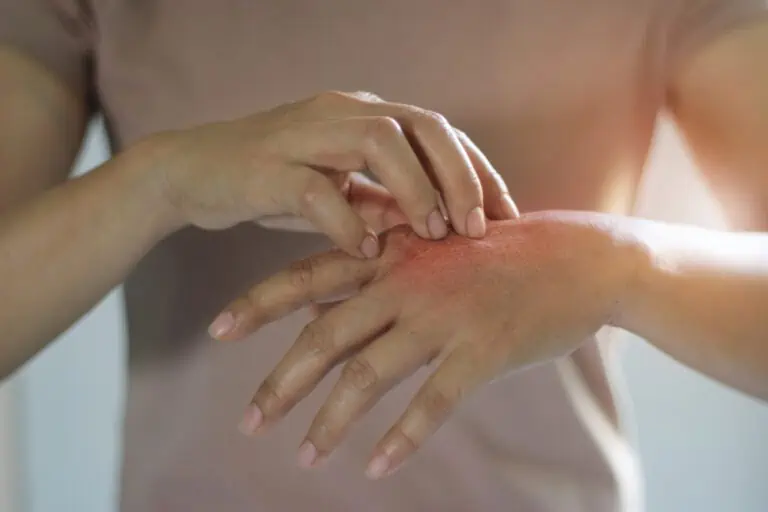Treating Stress-Related Eczema on Hands

Stress and hand eczema deliver a one-two punch: Not only can stress trigger hand eczema flares in some people, but dealing with everyday life when you have itchy, red, blistering, cracked skin can cause stress, which—you guessed it—can make eczema on the hands worse. So how do you treat stress-related eczema on the hands?
You may be able to tame flares by using an over-the-counter hand eczema cream or hydrocortisone cream, or even taking oral antihistamines. But if stress or anxiety sends your eczema into overdrive, you’ll want to add some stress reduction techniques to your eczema treatment plan.
Read on to learn more about stress-related eczema on hands and what you can do to make it go away.
Can stress cause eczema?
Stress eczema is real. While hand eczema is often caused by frequent or prolonged water exposure, contact with irritating chemicals or contact with allergens such as nickel, stress can worsen eczema, especially a kind of eczema called dyshidrotic eczema. This type of eczema causes tiny, itchy, painful blisters, typically on the palms.
How does stress compound the problem? By causing additional inflammation, which lies at the root of the condition. Stress releases chemicals such as cortisol. Over time, too much cortisol causes an immune system reaction that creates inflammation throughout the body, including the skin. Skin inflammation can lead to swelling and rashes.
In addition, stress that’s poorly managed can increase the risk of anxiety and depression, which are also associated with increased inflammation.
Does stress cause your palms to sweat? That sweat can make dyshidrotic eczema worse.
How to treat stress-induced eczema on your hands
If you have hand eczema, start by seeing a dermatologist. They can give you an accurate diagnosis, help you identify your triggers and develop a customized treatment plan to get the eczema under control.
Hand eczema treatments
To treat hand eczema, your dermatologist may recommend an over-the-counter antihistamine and prescribe a topical medicine. If your eczema doesn’t improve significantly, another treatment option is phototherapy, aka light therapy. For more severe cases, dermatologists sometimes prescribe oral immune system suppressants or strong medicines known as biologics, which may be given by injection.
Your dermatologist will probably also suggest that you:
- Avoid excessive water exposure, for instance by taking shorter showers and washing dishes in the dishwasher instead of by hand or wearing waterproof gloves while you wash them.
- Refrain from using alcohol-based hand sanitizers when possible.
- Avoid harsh cleansers, detergents and other chemicals (and wear cotton-lined gloves when you can’t).
- Wear gloves when you work with your hands in the garden or elsewhere.
- Wear disposable gloves if preparing onions or citrus fruits irritates your hands.
It’s also important to use an emollient, thick moisturizer or ointment, especially after you wash your hands or shower. Look for a moisturizer with bonus ingredients such as ceramides and glycerin to help repair the outermost layer of skin, called the skin barrier. The skin barrier protects your hands against dryness and irritation, and stress can weaken it.
Stress management strategies
If you think stress is making your hand eczema worse, ask yourself what you can do to reduce or eliminate the biggest sources of stress in your life. At the same time, adopt daily habits that help you feel calmer. It may take some trial and error to find ones that work for you, but research has shown that these approaches can help relieve stress and anxiety:
- Mind-body practices such as yoga and meditation
- Deep breathing exercises
- Progressive muscle relaxation (sit or lie down and tense and then relax one muscle group at a time)
- Regular physical activity, such as brisk walks
- Spending time outdoors or watching nature videos
- Hanging out with family and friends, especially people who are good at listening or offering practical support
- Cultivating a hobby
If you find that you can’t quite manage stress or anxiety on your own, seek help. You might look for a therapist who offers cognitive behavioral therapy (CBT). According to the American Psychological Association, CBT works by teaching people how to think differently about the things that stress them out or trigger anxiety.
The combination of treatments from your dermatologist and lifestyle changes should help you get control of stress-related eczema on your hands so you can text, type and button your shirt with hands that don’t itch, burn, blister or bleed.
Medically reviewed by Stephanie A. McNamara, MD
Written by Maura Rhodes, a writer and editor specializing in health and well-being.


